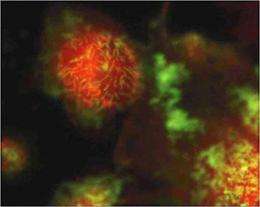World's only dog test for a culprit in 'kennel cough'

The world's first diagnostic test for canine pneumovirus, a unique culprit in "kennel cough"—canine respiratory illness common in shelters and kennels—is now available at Cornell's Animal Health Diagnostic Center (AHDC).
The test is one of several available in the AHDC's new canine respiratory panel, which offers a faster, easier and more accurate way to diagnose what is commonly called "kennel cough," respiratory diseases that often emerge in such places as shelters and kennels where dogs live in close quarters. In such settings, quick correct diagnosis is critical to curbing outbreaks. Other methods of detecting culprits in respiratory cases take weeks of testing.
Discovered in 2008 at the AHDC, canine pneumovirus causes cell death in patterns unlike other viruses commonly found in dogs. Veterinarians had no way of identifying it from among the many pathogens causing canine respiratory illness until now.
"This is a great tool for handling respiratory outbreaks in dogs," said Amy Glaser, director of the AHDC's molecular diagnostics lab. "It can also detect multiple pathogens in a single sample. It greatly simplifies testing and will make it easier for veterinarians to get answers for their patients."
The panel uses polymerase chain reaction (PCR) analysis to identify the most common viruses and bacteria associated with canine respiratory disease. Detected pathogens include the canine viruses parainfluenza 5, respiratory coronavirus (beta coronavirus), pneumovirus, adenovirus (types 1 and 2), distemper and influenza. The panel also detects the bacteria Mycoplasma cynos and Bordatella bronchiseptica, which can infect humans.
Previously, only canine influenza could be detected by PCR at the AHDC. Other canine respiratory pathogens were only detectable by isolation in cell or bacterial culture or by testing paired serum samples. Developed by Edward Dubovi, professor of virology, and his team in the AHDC's virology section, the new PCR panel can detect viruses that are difficult to detect by the former culture method.
PCR tests can be ordered individually for $36.75, or as a panel at a discount rate of $115. Results are available in three to five business days after sample receipt at the lab. Interpretation services are always included.
To enable detection of both viruses and bacteria, the AHDC suggests submitting both a nasal and an oral pharyngeal swab. Swabs can be submitted together in a red-top tube with a few drops of saline or in commercial viral transport media. Aerobic culture and antimicrobial susceptibility testing of swab samples are also available. Additional samples must be collected and submitted separately in a suitable bacterial transport medium such as Amies.
Provided by Cornell University
















